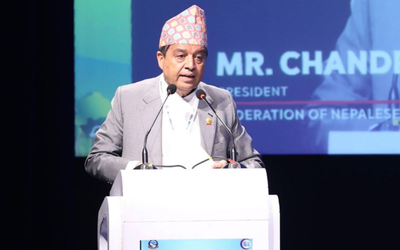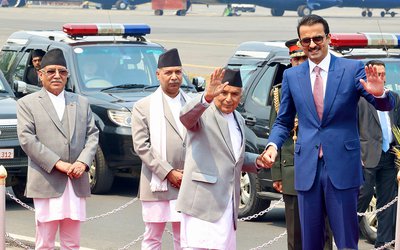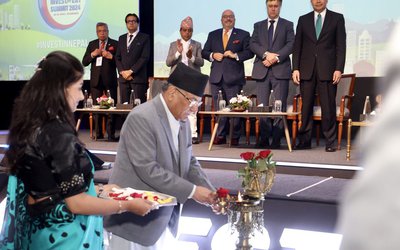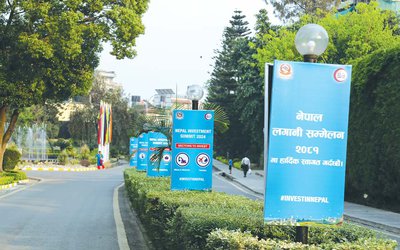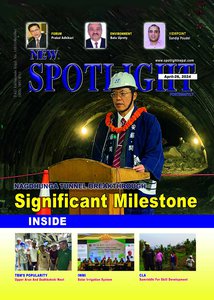The Civil Society-State Interface in Nepal
(Renegotiating the Role Between The Private and the Political)
Edited By Anand Aditya
Published by Pragya Foundation, Friedrich Ebert Foundation (2011)
Price: Undisclosed
Pages:223
With the liberalization of political system in Nepal in 1990,there was a mushrooming growth in the number of civil society organizations. After the People’s Movement II in 2006, another series of floodgates opened.
Despite the increase in the number of civil society organizations, the Social Welfare Council, the institution created to regularize these organizations, failed to perform its duty. In this context, the involvement of civil society organizations extensively expanded. Over 31,000 NGOs have been working in different parts of Nepal. Here comes the controversy over their roles and duties.
At a time when there is a growing dispute and debate over the role of civil society organizations, the book comes out with the agenda and issue prevailing in the contemporary society. Every country needs independent and impartial civil society to self-organize and Nepal is no exception. However, the recent trend in Nepal is different. Civil society organizations are ideologically divided and losing their essential identity.
“Nepal boasts a rich tradition of civic heritage based in the sovereignty of enlightenment over power and privilege reflected in the wisdom of Sage Veda Vyas, Videha Janak, Seer Ashtavakra and Buddha the Enlightened,” writes Dev Raj Dahal, head FES Nepal Office in his foreword. “The book captures the foundation as well as the process of the ongoing formation of Nepal’s civil society, to show a way out of the political conundrum by shoring up the wisdom expounded by the sages, heroes, and builders of this nation-in-the making whose cosmos mirrors what humanity deeply aspires for today-living peacefully in harmony with all living beings.”
Dahal rightly pointed out the present state of civil society organizations and its role in Nepal. One of the weaknesses of the civil society movement in Nepal is that there are rare debates over their role. "One problem is that there has been little public debate on public goods, public roles and relationships. It is, however, time now that such a discourse starts to bring the gap between the private sector of individual citizens and the political sector of government," writes Anand Aditya in his preface.
The book consists of the research papers presented by many renowned authors of Nepal debating the role of civil society organizations and their implications in society. Anand Aditya's From Subjects to Citizens: Civic Transformation in captive society discusses the overall process of evolution of civil society in Nepal. Dev Raj Dahal's paper The Enlightenment Tradition of Nepal: Can the Civil Society Grasp It discuss the long history of Nepalese process of civil society. Similarly, journalist Yubaraj Ghimire discusses challenges of citizenship building in Nepal.
CD Bhatta's paper The Civil Society-State Interface highlights how civil society is supplementing and complementing in the process of national development and institutional growth.
Anjoo Sharan Upadhyaya and Hemraj Subedi's paper discusses the role of civil society in the peace process of Nepal in the last eight years.Tika Prasad Dhakal's paper highlights the role civil society has been playing in Nepal in the areas of peace politics. Dr. Sambhuram Simkhada's paper reflection of civil society helps to learn the evolution of civil society organizations in Nepal. Tone Bleie's paper Multi-track approaches to peace building in Nepal and Julius Engel's article on challenges on transitional justice system in Nepal discusses the role played by civil society organizations in Nepal. Pramod Mishra analyzes the role of opinion polls in the civil society in Nepal in 2011.
Published by Pragya Foundation and Friedrich Ebert Foundation, the book analyzes the civil society movements and their contributions in the Nepalese society and their inter-relations with state.
- QATAR AMIR’S STATE VISIT: Five Agreements
- Apr 28, 2024
- TANAHU HYDROPOWER PROEJCT: A Significant Achievement
- Apr 15, 2024
- AMBASSADOR HANAN GODAR: Sharing Pain With A Nepali Family
- Mar 30, 2024
- VISIT OF KfW AND EIB TO NEPAL : Mission Matters
- Mar 25, 2024
- NEPAL BRITAIN SOCIETY: Pratima Pande's Leadership
- Mar 24, 2024







